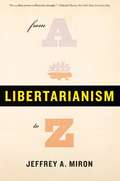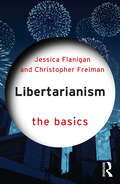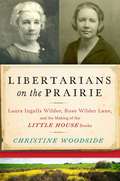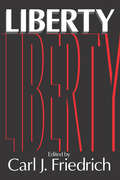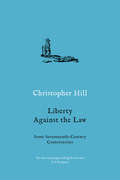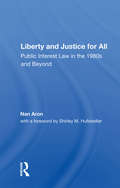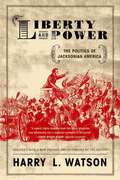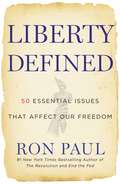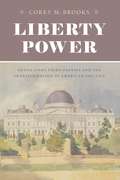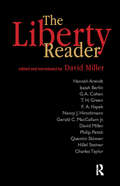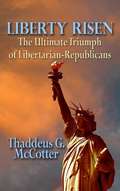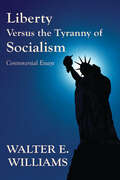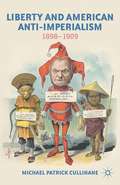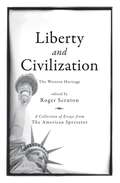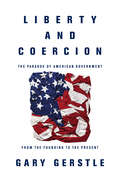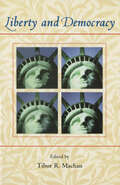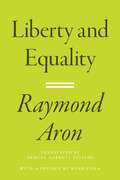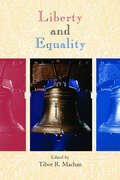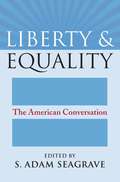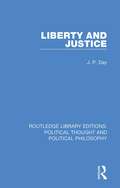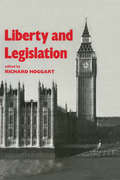- Table View
- List View
Libertarianism from A to Z
by Jeffrey A. MironLibertarian principles seem basic enough--keep government out of boardrooms, bedrooms, and wallets, and let markets work the way they should. But what reasoning justifies those stances, and how can they be elucidated clearly and applied consistently? In Libertarianism, from A to Z, acclaimed Harvard economist Jeffrey Miron sets the record straight with a dictionary that takes the reader beyond the mere surface of libertarian thought to reveal the philosophy's underlying and compelling logic. Tackling subjects as diverse as prostitution and drugs, the financial crises and the government bailouts, the legality of abortion, and the War on Terror, Miron takes the reader on a tour of libertarian thought. He draws on consequentialist principles that balance the costs and benefits of any given government intervention, emphasizing personal liberty and free markets. Miron never flinches from following those principles to their logical and sometimes controversial ends. Along the way, readers get a charming and engaging lesson in how to think like a libertarian. Principled, surprising, and thought provoking, Libertarianism, from A to Z, has everything a bourgeoning libertarian--or any responsible citizen--needs to know.
Libertarianism: The Basics (The Basics)
by Jessica Flanigan Christopher FreimanLibertarianism: The Basics is an up-to-date and accessible introduction to libertarianism that breaks down abstract philosophical ideas in a fresh way.Flanigan and Freiman interweave a wide-ranging survey of different libertarian philosophical traditions, with a discussion of libertarian perspectives on various applied topics of contemporary interest. Chapters introduce readers to the major theoretical debates in libertarianism, illustrating these debates through real-world policy case studies that draw on contemporary issues concerning criminal justice reform, immigration policy, national security, the environment, and more.Ideal for teaching and appropriate for students at all levels, including high school, Libertarianism: The Basics will be the go-to text for anyone who is interested in learning more about political philosophy, applied ethics, philosophy, politics, economics, and public policy. The authors present arguments and ideas through a series of historical and contemporary cases, making the book suitable for all readers who want to learn about cutting-edge libertarian views on matters in both political philosophy and public policy.
Libertarians on the Prairie: Laura Ingalls Wilder, Rose Wilder Lane, and the Making of the Little House Books
by Christine WoodsideGenerations of children have fallen in love with the pioneer saga of the Ingalls family, of Pa and Ma, Laura and her sisters, and their loyal dog, Jack. Laura Ingalls Wilder's Little House books have taught millions of Americans about frontier life, giving inspiration to many and in the process becoming icons of our national identity. Yet few realize that this cherished bestselling series wandered far from the actual history of the Ingalls family and from what Laura herself understood to be central truths about pioneer life. In this groundbreaking narrative of literary detection, Christine Woodside reveals for the first time the full extent of the collaboration between Laura and her daughter, Rose Wilder Lane. Rose hated farming and fled the family homestead as an adolescent, eventually becoming a nationally prominent magazine writer, biographer of Herbert Hoover, and successful novelist, who shared the political values of Ayn Rand and became mentor to Roger Lea MacBride, the second Libertarian presidential candidate. Drawing on original manuscripts and letters, Woodside shows how Rose reshaped her mother's story into a series of heroic tales that rebutted the policies of the New Deal. Their secret collaboration would lead in time to their estrangement. A fascinating look at the relationship between two strong-willed women, Libertarians on the Prairie is also the deconstruction of an American myth. Skyhorse Publishing, along with our Arcade, Good Books, Sports Publishing, and Yucca imprints, is proud to publish a broad range of biographies, autobiographies, and memoirs. Our list includes biographies on well-known historical figures like Benjamin Franklin, Nelson Mandela, and Alexander Graham Bell, as well as villains from history, such as Heinrich Himmler, John Wayne Gacy, and O. J. Simpson. We have also published survivor stories of World War II, memoirs about overcoming adversity, first-hand tales of adventure, and much more. While not every title we publish becomes a New York Times bestseller or a national bestseller, we are committed to books on subjects that are sometimes overlooked and to authors whose work might not otherwise find a home.
Libertas and the Practice of Politics in the late Roman Republic
by Valentina ArenaThis is a comprehensive analysis of the idea of libertas and its conflicting uses in the political struggles of the late Roman Republic. By reconstructing Roman political thinking about liberty against the background of Classical and Hellenistic thought, it excavates two distinct intellectual traditions on the means allowing for the preservation and the loss of libertas. Considering the interplay of these traditions in the political debates of the first century BC, Dr Arena offers a significant reinterpretation of the political struggles of the time as well as a radical reappraisal of the role played by the idea of liberty in the practice of politics. She argues that, as a result of its uses in rhetorical debates, libertas underwent a form of conceptual change at the end of the Republic and came to legitimise a new course of politics, which led progressively to the transformation of the whole political system.
Liberty (Nomos Ser. #No. 4)
by Carl J. FriedrichRecent writing on the nature of freedom has served to underline a crucial gap in the academic experience. First--and most obviously--the concept of freedom has been modernized by its application to contemporary institutions. Second, a new approach to the concept of liberty has been pioneered in the construction of new typologies of freedom. Finally, awareness of variety in concepts of freedom has been paralleled in variations in the practice of freedom. The tumultuous history of Western man may be conceptualized as the story of how freedom has become embodied. What is missing from the story is the relationship of concepts to actions.This relationship has been established for some specific notions of freedom. Many of the philosophical analyses--especially recent ones like pragmatism and existentialism--have been predicated on actual human behavior. On the other hand, many classic histories of freedom--those of Georg Wilhelm Friedrich Hegel, John Bagnell Bury, Guido de Ruggiero, and Harold Laski--have traced the actual development of a definite kind of freedom.This volume contains essays prepared to celebrate the anniversary of the publication of John Stuart Mill's On Liberty, revised in the light of discussions by Henry D. Aiken, William Ebenstein, Mark DeWolfe Howe, and David Spitz, as well as other articles, many of them growing out of the discussion either in the form of commentary or independent contributions. There are also two papers written independently (Andrew Hacker and Leonard Krieger).
Liberty Abroad
by Georgios VarouxakisJohn Stuart Mill (1806-1873) is widely regarded as the pre-eminent thinker of the liberal tradition; and yet because his views on international relations cannot be traced in any particular book or essay, his political thought remains largely misunderstood. Liberty Abroad is the first comprehensive, critical study which brings together all of John Stuart Mill's extensive contributions with particular attention to the historical contexts in which they were produced, as well as the political and philosophical preoccupations that prompted them, and how they were received among his contemporaries. As a leading Mill scholar, Georgios Varouxakis combines meticulous mastery not only of Mill's own varied and extensive writings, but across a diverse range of Victorian controversies to give a full and subtle evaluation of a major aspect of Mill's thinking in this definitive study which offers a valuable contribution to an area of increasing scholarly interest: the history of international political thought.
Liberty Against the Law: Some Seventeenth-Century Controversies
by Christopher HillA classic study of popular resistance to the momentous changes of 17th century EnglandIn 17th Century England, the law was not an instrument of justice - it was an instrument of oppression. The enclosures of common land, loss of many traditional rights and draconian punishments for minor transgressions changed the lives of the peasantry and created a landless class of wage labourers. In this, the last book published during his lifetime, renowned historian of the English Revolution Christopher Hill explores the immense social changes that occurred and the expressions of liberty against the law through the literary culture of the times and the hero-worship of the outlaw. As well as chapters on gypsies and vagabonds, Hill analyses class, religion and the shift away from the importance of the church after the Reformation. Liberty Against the Law is a late classic of Hill's work, and essential reading for anyone interested in the history and politics of the 17th Century.
Liberty And Justice For All: Public Interest Law In The 1980s And Beyond
by Nan AronThe intention of this book is to provide a better understanding of the mission of public interest lawyers and stimulate thought about ways to energize and build a movement that advances social justice. I could not have succeeded in this effort without the help and support of many individuals and institutions. I wish to express my appreciation for their assistance. I am very grateful to the Board of Directors of the Alliance for Justice for its wisdom in establishing the Alliance and for its continuing support for this book and other important projects. I profited from discussion with many public interest lawyers, activists and foundation officers. These individuals, who are listed in Appendix D, gave generously of their time. A few merit special attention. Charles Halpern and the staff at the Council for Public Interest Law, who wrote Balancing the Scales of Justice: Financing Public Interest Law in America, provided a wonderful model for me to follow.
Liberty And Power: The Politics Of Jacksonian America
by Harry WatsonAs an engaging and persuasive survey of American public life from 1816 to 1848, Harry L. Watson's Liberty and Power remains a landmark achievement. Now updated to address twenty-five years of new scholarship, the book brilliantly interprets the exciting political landscape that was the age of Jackson-a time that saw the rise of strong political parties and an increased popular involvement in national politics. In this enduring and impressive work, Watson examines the tension between liberty and power that both characterized the period and formed part of its historical legacy.
Liberty Before Liberalism
by Quentin SkinnerThis extended essay by one of the world's leading historians seeks, in its first part, to excavate and to vindicate, the neo-Roman theory of free citizens and free states as it developed in early modern Britain. This analysis leads on to a powerful defence of the nature, purposes and goals of intellectual history and the history of ideas. As Quentin Skinner says, 'the intellectual historian can help us to appreciate how far the values embodied in our present way of life, and our present ways of thinking about those values, reflect a series of choices made at different times between different possible worlds'. This essay provides one of the most substantial statements yet made about the importance, relevance and potential excitement of this form of historical enquiry. Liberty before Liberalism is based on Quentin Skinner's Inaugural Lecture as Regius Professor of Modern History in the University of Cambridge, delivered in 1997.
Liberty Defined: 50 Essential Issues That Affect Our Freedom
by Ron PaulIn Liberty Defined, congressman and #1 New York Times bestselling author Ron Paul returns with his most provocative, comprehensive, and compelling arguments for personal freedom to date. The term "Liberty" is so commonly used in our country that it has become a mere cliché. But do we know what it means? What it promises? How it factors into our daily lives? And most importantly, can we recognize tyranny when it is sold to us disguised as a form of liberty? Dr. Paul writes that to believe in liberty is not to believe in any particular social and economic outcome. It is to trust in the spontaneous order that emerges when the state does not intervene in human volition and human cooperation. It permits people to work out their problems for themselves, build lives for themselves, take risks and accept responsibility for the results, and make their own decisions. It is the seed of America. This is a comprehensive guide to Dr. Paul's position on fifty of the most important issues of our times, from Abortion to Zionism. Accessible, easy to digest, and fearless in its discussion of controversial topics, LIBERTY DEFINED sheds new light on a word that is losing its shape.
Liberty Power
by Corey M. BrooksAbraham Lincoln's Republican Party was the first party built on opposition to slavery to win on the national stage--but its victory was rooted in the earlier efforts of under-appreciated antislavery third parties. Liberty Power tells the story of how abolitionist activists built the most transformative third-party movement in American history and effectively reshaped political structures in the decades leading up to the Civil War. As Corey M. Brooks explains, abolitionist trailblazers who organized first the Liberty Party and later the more moderate Free Soil Party confronted formidable opposition from a two-party system expressly constructed to suppress disputes over slavery. Identifying the Whigs and Democrats as the mainstays of the southern Slave Power's national supremacy, savvy abolitionists insisted that only a party independent of slaveholder influence could wrest the federal government from its grip. A series of shrewd electoral, lobbying, and legislative tactics enabled these antislavery third parties to wield influence far beyond their numbers. In the process, these parties transformed the national political debate and laid the groundwork for the success of the Republican Party and the end of American slavery.
Liberty Reader (Edinburgh University Press Series)
by David MillerFor centuries past, the quest for liberty has driven political movements across the globe, inspiring revolutions in America, France, China and many other countries. Now, we have Iraq and the idea of liberation through preemption. What is this liberty that is so fervently pursued? Does it mean a private space for individuals, the capacity for free and rational choice, or collective self-rule? What is the difference between positive and negative liberty, or the relationship between freedom and coercion? Reflecting on these questions reveals a surprisingly rich landscape of ideas - and further questions. "The Liberty Reader" collects twelve of the most important and insightful essays on issues of freedom currently available. It is essential reading for students of social and political theory, political philosophy, and anyone who wants a deeper understanding of the variety of ideas and ideals behind perennial human strivings for liberty.
Liberty Risen: The Ultimate Triumph of Libertarian-Republicans
by Thaddeus MccotterIn this Internet Age, is the Grand Old Party over for the Republican Establishment? If so, what individuals and ideas will ascend to meet the moment and revitalize a party that is now viewed as more of an antiquated complaint than a transcendent cause? In "Liberty Risen: The Ultimate Triumph of Libertarian-Republicans", former GOP House Republican Policy Chair - and NOT a Libertarian - Thaddeus McCotter articulates the political and cultural circumstances driving the GOP's once disdained Libertarian wing to its present prominence and predestined dominance. Yet, if Liberty is risen, when will it reign? To find out, buy the book.
Liberty Versus the Tyranny of Socialism: Controversial Essays
by Walter E. WilliamsIn this selected collection of his syndicated newspaper columns, Walter Williams offers his sometimes controversial views on education, health, the environment, government, law and society, race, and a range of other topics. Although many of these essays focus on the growth of government and our loss of liberty, many others demonstrate how the tools of freemarket economics can be used to improve our lives in ways ordinary people can understand.
Liberty and American Anti-Imperialism: 1898-1909
by Michael Patrick CullinaneThis book provides a study of the American anti-imperialist movement during its most active years of opposition to US foreign policy, from 1898 to 1909. It re-evaluates the movement's motives and operations throughout these years by evaluating the way in which Americans conceived the idea of 'liberty. '
Liberty and Civilization
by Roger ScrutonAn essential volume of essays commissioned by the American Spectator and edited by the philosopher Roger Scruton, Liberty and Civilization examines the intellectual and spiritual traditions of our belief in individual liberty, from its Judeo Christian origins on through Enlightenment philosophy. As we are confronted by belligerent atheism at home and jihadist Islam abroad, Liberty and Civilization is an invaluable tool for understanding why it is critical that we defend the cultural, religious, and intellectual institutions that have made our civilization great.As one would expect from the American Spectator, the responses are both fiery and edifying, representing a broad swath of American conservative thought. The essayists include Paul Johnson, Anne Applebaum, Robert Bork, Robert P. George, Christina Hoff Sommers, and Roger Scruton.
Liberty and Coercion
by Gary GerstleAmerican governance is burdened by a paradox. On the one hand, Americans don't want "big government" meddling in their lives; on the other hand, they have repeatedly enlisted governmental help to impose their views regarding marriage, abortion, religion, and schooling on their neighbors. These contradictory stances on the role of public power have paralyzed policymaking and generated rancorous disputes about government's legitimate scope. How did we reach this political impasse? Historian Gary Gerstle, looking at two hundred years of U.S. history, argues that the roots of the current crisis lie in two contrasting theories of power that the Framers inscribed in the Constitution. One theory shaped the federal government, setting limits on its power in order to protect personal liberty. Another theory molded the states, authorizing them to go to extraordinary lengths, even to the point of violating individual rights, to advance the "good and welfare of the commonwealth." The Framers believed these theories could coexist comfortably, but conflict between the two has largely defined American history. Gerstle shows how national political leaders improvised brilliantly to stretch the power of the federal government beyond where it was meant to go--but at the cost of giving private interests and state governments too much sway over public policy. The states could be innovative, too. More impressive was their staying power. Only in the 1960s did the federal government, impelled by the Cold War and civil rights movement, definitively assert its primacy. But as the power of the central state expanded, its constitutional authority did not keep pace. Conservatives rebelled, making the battle over government's proper dominion the defining issue of our time. From the Revolution to the Tea Party, and the Bill of Rights to the national security state, Liberty and Coercion is a revelatory account of the making and unmaking of government in America.
Liberty and Democracy
by Tibor R. MachanIn Liberty and Democracy, contributors grapple with the issue of the proper role of democracy in a society that is committed to respecting protecting the individual rights of all. They challenge conventional thinking, offering provocative ideas on democracy and individual freedom.
Liberty and Equality
by Raymond AronAn invaluable reflection on the essence of liberal democracy—and an ideal introduction to the work of political philosopher Raymond AronLiberty and Equality is the first English translation of the last lecture delivered at the Collège de France by Raymond Aron, one of the most influential political and social thinkers of the twentieth century. In this important work, the most prominent French liberal intellectual of the Cold War era presents his views on the core values of liberal democracy: liberty and equality. At the same time, he provides an ideal introduction to key aspects of his thought.Ranging from Soviet ideology to Watergate, Aron reflects on root concepts of democracy and representative government, articulates a notion of liberty or freedom as equal right as distinct from equal outcome, and discusses different kinds of liberties: personal, political, religious, and social. In search of a common truth or at least a common good, and analyzing what he perceives as the crisis of liberal democracies, Aron opens a space for reexamining the relation between liberty and equality.
Liberty and Equality
by Tibor R. MachanThis book takes an unflinching look at the difficult, often emotional issues that arise when egalitarianism collies with individual liberties, ultimately showing why the kind of egalitarianism preached by socialists and other sentimentalists is not an option in a free society.
Liberty and Equality: The American Conversation
by S. Adam SeagraveAlexis de Tocqueville, one of the greatest commentators on the American political tradition, viewed it through the lens of two related ideas: liberty and equality. These ideas, so eloquently framed by Thomas Jefferson in the Declaration of Independence, have remained inextricably and uniquely conjoined in American political thought: equality is understood as the equal possession of natural rights to life, liberty, and the pursuit of happiness. By considering American reflections on these core ideas over time--in relation to constitutional principles, religion, and race--this volume provides an especially insightful perspective for understanding our political tradition. The book is at once a summary of American history told through ideas and an inquiry into the ideas of liberty and equality through the lens of American history. <p> To a remarkable extent, American politics has always been thoughtful and American thought has always been political. In these pages, we see how some of our greatest minds have grappled with the issues of liberty and equality: Tocqueville and Jefferson, Alexander Hamilton as Publius in The Federalist, James Madison, George Washington, William Lloyd Garrison, Frederick Douglass, Abraham Lincoln debating Stephen Douglas, and Franklin D. Roosevelt. In essays responding to these primary sources, some of today's finest scholars take up topics critical to the American experiment in liberal democracy--political inequality, federalism, the separation of powers, the relationship between religion and politics, the history of slavery and the legacy of racism. Together these essays and sources help to clarify the character, content, and significance of American political thought taken as a whole. They illuminate and continue the conversation that has animated and distinguished the American political tradition from the beginning--and, hopefully, better equip readers to contribute to that conversation.
Liberty and Justice (Routledge Library Editions: Political Thought and Political Philosophy #18)
by J. P. DayFirst published in 1987. "Justice and liberty are the central concepts of social and political thought." These true words of Raphael‘s indicate the importance of these concepts, which resides in the fact that they are significantly linked to most of the other key notions in this field of thought, so that an understanding of them is indispensable for an adequate grasp of Social Philosophy. The author explores these concepts on essays on freedom and fairness, and will be of great interest to students of philosophy.
Liberty and Legislation
by Richard HoggartHas legislation over-reached itself? The contributors to this volume discuss whether the increase in legislative instruments of many kinds, often promoted with good intentions, may be progressively limiting both our individual and our communal freedoms. Contributors include Bernard Crick, Maurice Peston and James Ferman discuss this key idea in accessible and forthright style.
Liberty and Nature: An Aristotelian Defense of Order
by Douglas B. Rasmussen Douglas J. Den UylThe chapters which follow do offer discussions in ethics, metaphysics, epistemology, and related fields; but these fields are discussed to the extent that they have a bearing on political philosophy. One of our purposes in writing this work is to defend the liberal political heritage. The reader, however, will quickly discover that we do so from a rather nontraditional perspective, as such defenses go. We attempt to defend the liberal tradition from an Aristotelian foundation.
